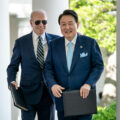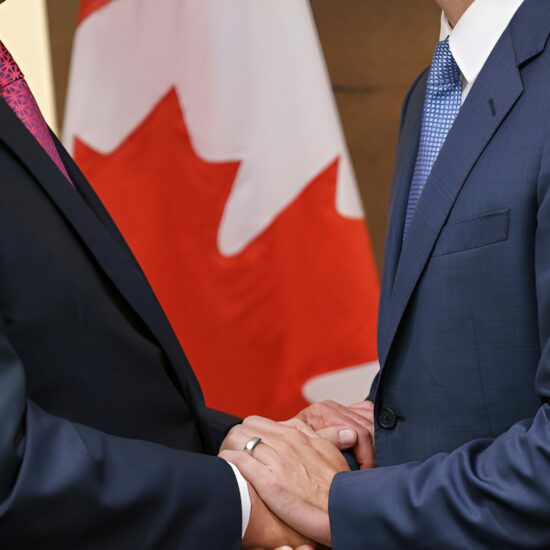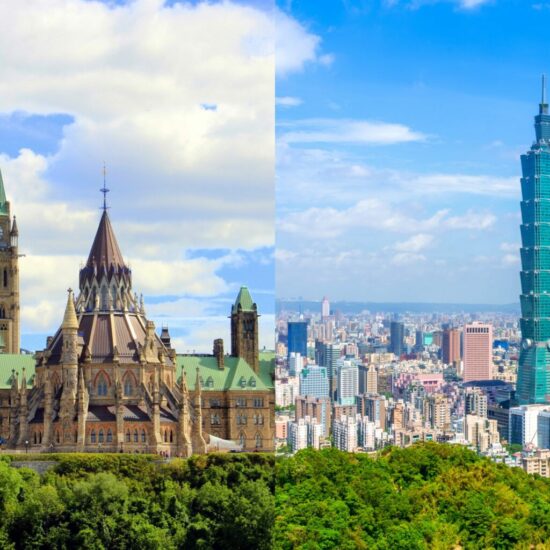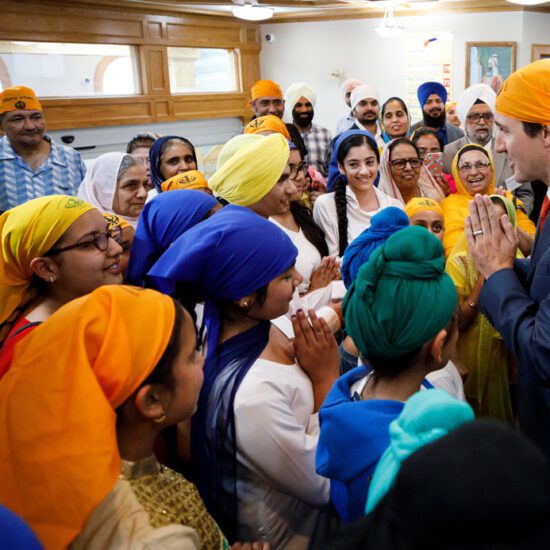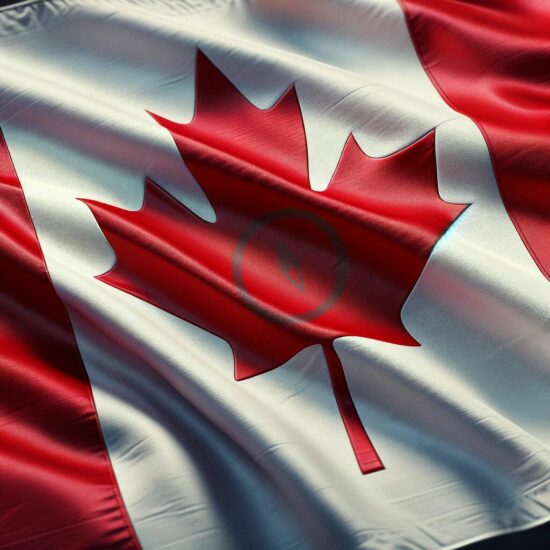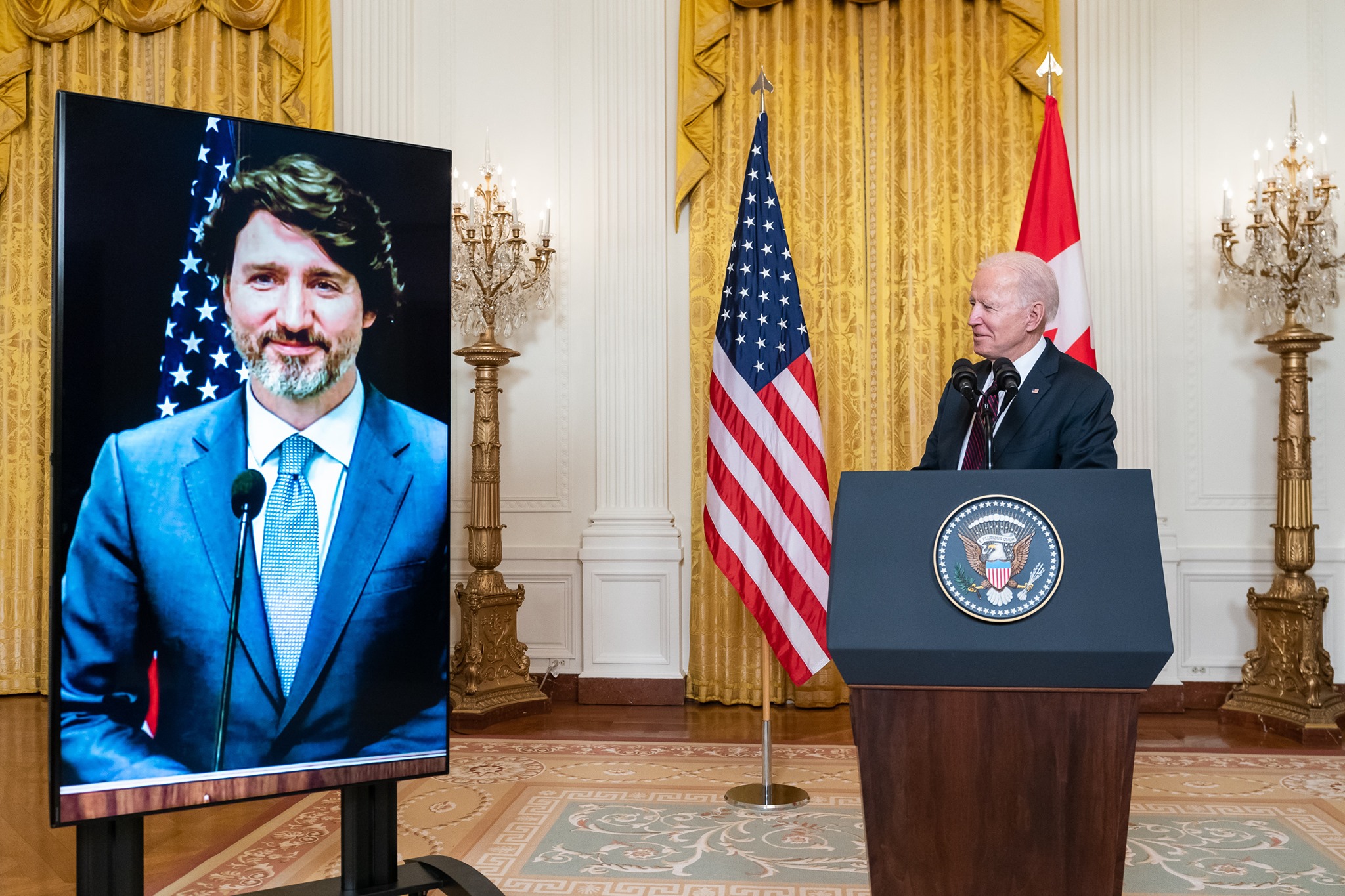
Image credit: The White House
As U.S. President Joe Biden celebrates 100 days in office, it has become possible to discern preliminary patterns in his administration’s foreign policy. These, in turn, can inform how we should think about Canada’s evolving place in a world framed by great power rivalries between Moscow, Beijing, and Washington.
At a CNN townhall event during the 2020 presidential campaign, Biden famously labeled China a “serious competitor” while defining Russia more unambiguously as an “opponent”. Such characterizations conform with conventional analyses that cast China as the key beneficiary of the globalization and “the rules-based international order [that] have facilitated its rapid economic rise” that seeks equal influence and heightened status within the existing system, view Russia as a hostile outsider aiming “to overturn the current liberal order” that has left it marginalized, and believe America capable of managing disruptions to this order and maintaining its leadership role through its network of international alliances.
When paired with the political climate resulting from the Russiagate debacle, it was safe to assume that a Democrat White House would adopt a more hawkish posture toward Moscow than that taken by the Trump administration. At the same time, in part due to the need for cooperating on issues such as climate change and global health, many experts predicted a mini-détente in U.S.-China relations at the outset of the new administration, even if the growing trend toward Sino-American confrontation would prove difficult to arrest over the course of Biden’s term in office.
More than three months after the inauguration, events have played out differently. Washington and Beijing have skipped any attempt at a reset, with a high-profile shouting match between American and Chinese representatives in Anchorage marking a new phase in the escalation of tensions between the two powers. The Biden administration has also retained the containment-centric “Indo-Pacific” nomenclature employed by its predecessor and has emphasized deepening the Quad strategic partnership that features the U.S. along with Australia, Japan, and India. While one could claim that the latter represents a change in tactic by the Biden administration away from American hegemony and unilateralism toward coalition-building, it nonetheless demonstrates the strength of the newly formed bipartisan anti-China consensus that now prevails in Washington.
In contrast, since Biden’s perhaps undiplomatic comment labeling Russian President Vladimir Putin a “killer”, U.S.-Russia relations have thawed a bit. The White House readout of a call between the two presidents last month noted Biden’s desire for a “stable and predictable relationship with Russia”. Shortly thereafter, when imposing a fresh round of sanctions against Russia, Biden was careful to stress the proportionate nature of the measures and called for a de-escalation of tensions between the two countries. Biden and Putin now appear set to hold a bilateral summit next month at the former’s initiative, although the shadow of Ukraine looms large over any talks.
Biden is the first American president in the post-Cold War era not to enter office in the context of an offer to reset, improve, or normalize the relationship between Washington and Moscow. Dmitri Trenin, director of the Carnegie Moscow Center, contends that a Biden-Putin summit would not mark the dawn of a new Russo-American détente, but rather merely a meeting between two “adversaries” or “unfriendly powers”. Still, these recent developments, when paired with the administration’s pledge to withdraw U.S. troops from Afghanistan by 9/11, demonstrate Biden’s commitment to prioritizing restraint in certain foreign policy theatres in order to devote more resources to competing with China.
Of course, the Euro-Atlantic security theatre remains laden with flashpoints which could further escalate tensions between NATO and Russia, particularly in Ukraine. But for the time being, it appears as if the dividing lines on the continent have calcified and a new modus vivendi has de facto been reached. Russia will not attack NATO countries, which the US has promised to defend, while Washington will not lend active military support to any country that it has not already brought under its security umbrella.
Recognition of Russia’s great power status has effectively been restored, with Western countries now forced to consider Moscow’s perspective before acting on security-related matters. At the same time, while the U.S. has not dialed back its pursuit of global leadership, it has tempered its enthusiasm for the unconstrained expansion of the “liberal international order”. At least in this respect, while the European security order may remain fragile and fragmented, it is no longer characterized by uncertainty.
This context presents some favourable conditions for the development of an independent and substantive Canadian foreign policy posture. In fact, despite various instances of policy coordination with Washington, Ottawa’s overall approach to relations with Russia and China is the inverse of the new strategy being pursued by its southern neighbour. While the U.S. under Biden has accelerated its competition with China, the Trudeau government has trodden a careful line and attempted not to alienate Beijing excessively, for example by abstaining on a parliamentary vote to label the human rights abuses in Xinjiang as a genocide.
Meanwhile, Russo-Canadian relations remain largely frozen as the Atlanticist pillar of Canadian foreign policy continues to monopolize Canada’s presence in Europe. If current trends persist, with Atlanticism waning in importance as global power shifts East and the U.S.-Russia rivalry stabilizing from an “active pressure campaign” to a more sustainable dynamic of deterrence, then Canada might find itself with the opportunity to adopt a more cooperative and inclusive approach to security matters on the European continent.
In a recent article, former Munk School Director Janice Stein posits that Canada faces two ideal-type options for navigating the emerging great power rivalries: 1) to pursue economic security through deeper ties with Washington, but at the cost of being forced to follow the Biden administration’s increasingly aggressive stance toward Beijing; or 2) deepen trading relations with China and the rest of Asia in the name of preserving Canadian autonomy. While on paper a fully integrated North American market would seem like a welcome development, in the absence of an EU-type arrangement of sovereignty pooling and collective decision-making, such a move would inevitably do away with what little is left of Canada’s global influence.
One could argue that the values-based foreign policy discourse that would accompany closer alignment with Washington could give Ottawa the opportunity to focus on developing its soft power, compensating for its declining clout after back-to-back failed UN Security Council bids and strained bilateral relations with several powers. This reduced influence has already curtailed much of Canada’s ability to have a meaningful impact on the future of the international system over the coming decade in an autonomous fashion, leaving it with little to lose by positioning itself closer to the US.
That said, the next few decades will prove indispensable to Canada’s ambitions to enhance its international profile by way of demographic growth, with the global population set to begin leveling out after the midway point of the century. Such long-term thinking depends on a national strategy that weaves domestic and international policy into an intellectually consistent whole. In a rapidly shifting world, a proactive posture tailored to Canada’s unique imperatives is necessary to provide a consistent basis for the development of national policy. Forgoing the pursuit of an independent foreign policy to focus on challenges closer to home would prove entirely self-defeating, leading to yet another lost decade for Canada on the world stage.
Attempting to cherry-pick from both scenarios may leave Canada with the worst of both worlds, without the benefits of a reliable relationship with the United States and bereft of a national strategy. If Canada wants to become a player that is taken seriously on the world stage, a more decisive approach is in order. This requires a clear and detailed vision of what norms, institutions, and mechanisms Ottawa should foster to build a more stable international order complementary to Canada’s core interests. Reacting to crises as they emerge with moral grandstanding and self-righteousness coupled with sanctions and repeating platitudes about the rules-based character of the existing order will not suffice.
Dr. Zachary Paikin (@zpaikin) is a Nonresident Research Fellow at IPD and a Researcher in the Foreign Policy unit at the Centre for European Policy Studies (CEPS) in Brussels.

